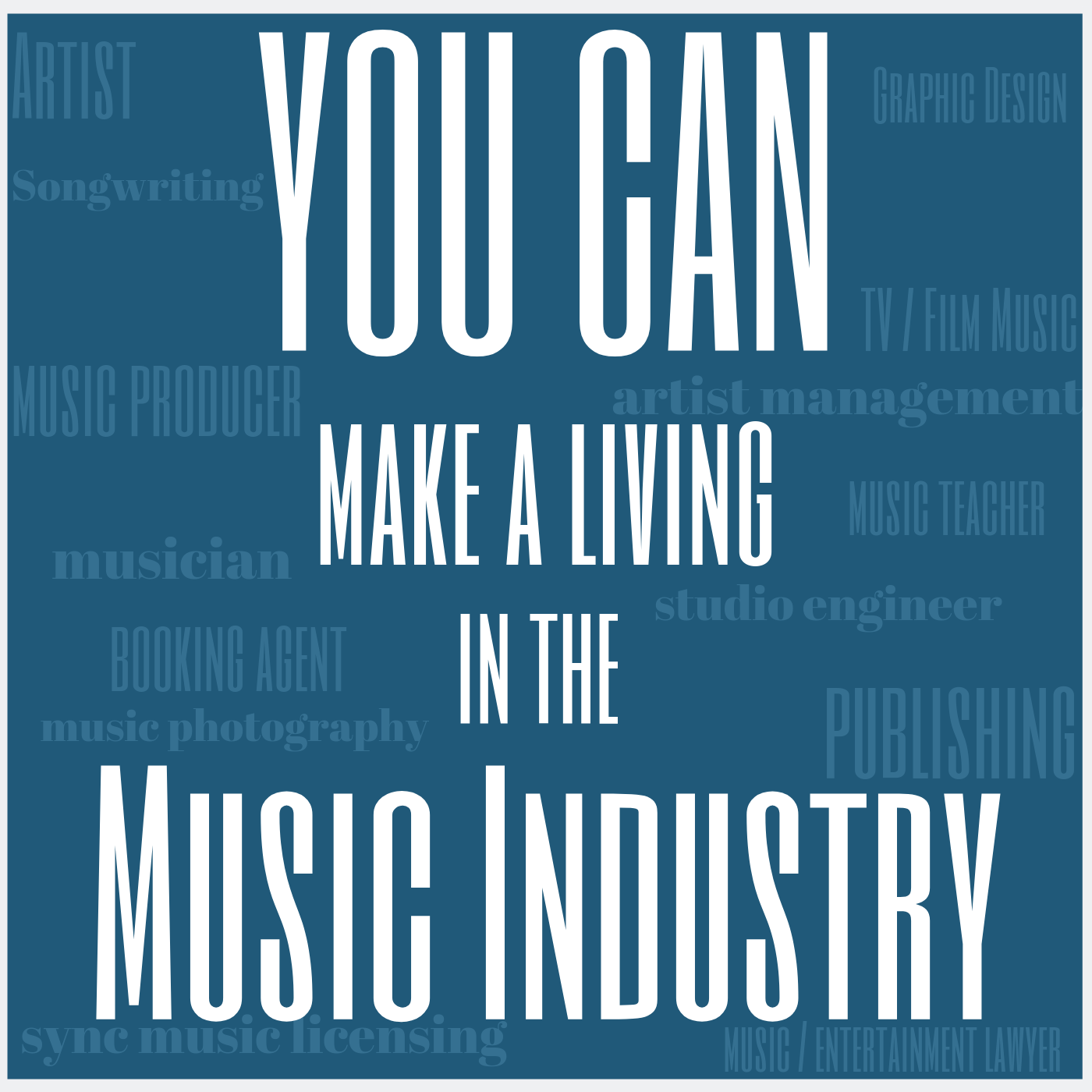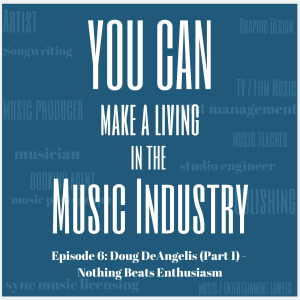

22.7K
Downloads
78
Episodes
Did you know that YOU CAN make a living in the music industry? Celebrities, working class musicians and people just like you who work behind the scenes in all areas of the music business will share their stories, encourage you and give you tools and how-to examples of the ways YOU CAN make a living doing what you love in the music industry.
Episodes

Monday Dec 09, 2019
Episode 6: Doug DeAngelis (Part 1) - Nothing Beats Enthusiasm
Monday Dec 09, 2019
Monday Dec 09, 2019

I met Doug DeAngelis at a Music Supervision event in Nashville recently and was intrigued because he has been a pioneer in what we know as dance, pop and rock music. His unique work as a music director and supervisor for award shows got my attention and I knew I wanted him on the show. In part 1 of our conversation Doug and I discuss his time producing the biggest names in pop music, being a composer for hit television shows and what it takes to be a music director for live t.v.
Show Notes:
Sponsors: Edenbrooke Productions - We offer consulting services and are offering listeners a 1-hour introductory special. To request more info on consulting services, email Marty at contact@johnmartinkeith.com.
Talking Points:
*I programmed analog synthesizers in the early days before MIDI and went to Berklee College of Music to study music synthesis.
*I saw music in colors and textures and layers.
*Enthusiasm is the single best ingredient in professional musicianship. Nothing beats enthusiasm.
*I started working at Syncro Sound studios owned by The Cars.
*It had one of the first MIDI rooms in the country and I worked programming.
*My first big project to work on was the debut album of Nine Inch Nails.
*Then went on tour with the band Inner City, one of the first pop/house (Detroit Techno/Club) music bands.
*Doug is a pioneer in Dance/Club music.
*Moved to New York to work for David Franken McMurphy and that was my start with working on all the big artists in pop music.
*When re-mixing an album, the record label picks the DJ and the DJ picks the producer to do the re-mix.
*Moved to L.A. to work on more records and ended up working in T.V. by accident. I got a call to be the music director for a live talent show called Next Big Star with Ed McMahon, a precursor to American Idol. I ended up becoming the music supervisor as well not knowing what that even meant.
*What does “clearing a song” mean for use on t.v. and film? It means identifying who the rights holders are for both the physical recording (the master) and the copyright (the publishing). Learning what cost is for all the different types of usages in t.v. or film. Learning how to do the paperwork and going out and getting the rights to license the songs to be used and have them signed off on before the show airs.
*Don’t say no to an opportunity. Say yes! Figure it out and do it.
*If you don’t take the opportunity when it comes your way, there are hundreds people waiting to take it from you.
*You have to be more enthusiastic than ALL the people you’re working with. More than your bosses, the contestants, the artists your producing music for, the songwriters you’re cutting demos for. That’s what people need. That’s the job.
*When you are making music for t.v. where you are on the clock, sometimes you are working for hours on a song and find out you can’t clear the rights to use it and you have to scrap it and start over knowing you have a lot more songs still do. Even then you have to stay enthusiastic. That’s the job.
*Don’t leave a project until you know you have made your client happy based off what you know you are capable of accomplishing.
*If you don’t impose your talent level on the client, you’re not finished yet. That’s enthusiasm.
*Elevate everyone around you.
*People who are great take everybody with them.
*If you want to work professionally as a musician, producer, songwriter, composer, music supervisor, etc. , make “that’s great” the base line for what you do and go beyond that until the client says “that’s the greatest thing I’ve ever heard.”
*Big things are easy to get right. It’s the little things that matter.
*How did you transition from Music Directing on live t.v. shows and music supervising to be a composer for t.v. shows?
*After multiple t.v. talent shows I produced a record for the group Love and Rockets and the singer and I started making music together that landed on some projects. We signed with CAA talent agency and pitched our reel to producer Michael Mann and landed the job scoring Robbery Homicide. That was my first job scoring a t.v. show.
*Why sign with an agency like CAA? my partner Kevin already had a connection with them because of his band Love and Rockets and we had an advantage of getting our music heard.
*When a new show is coming out, the studios will go to the big agents and say so and so has a new show and he is looking for a certain kind of music. Then everybody sends in their reels and the producer picks what they like.
*t.v producers and music supervisors, etc. go to licensing agencies and talent agencies for music and composers because they can vet you and your work to make sure your music is good and you can handle the pressure of the schedule, the pace, etc. which is very taxing.
*Scoring a drama is a 6 or 7 day turnaround which means 3 or 4 days to write the score because you have to have time for the producers and directors to hear it and make notes, then you revise the score and have it to stage the day before they mix the show.
*All of that is for about 35 minutes of score in an 60 minute show.
*What does a 24 hour day look like when you are scoring a show?
*Realistically you work 18-19 hours a day and sleep 5-6 hours.
* “Spot the episode” - meaning the composer, music supervisor, editor, director and the sound effects group meet together to watch a cut of the episode and you walk through it beat by beat, top to bottom of the showing making notes of what should be score, where there should be a song, where they want only sound design, end score, etc.
*Then you have to remember what you talked about and create score and songs around that because there are no sound effects, etc. actually there yet.
*When you’re scoring, understand that the better the film, the better your experience getting started at scoring is going to be.
*It’s very hard to score to picture that is not good. Film, dialogue, story, cinematography, etc. make everything roll easier.
*Music is all about you. When you’re scoring music for picture, it’s not about you anymore.
*You always have to keep in mind that the episode started as a script about a year and a half ago going through a bunch or re-writes and back and forth with the studio getting rejections. Then they shot it and re-shot it because the acting wasn’t great, etc.
*By the time it gets to you, It is what they want. So you have to be aware of that and score music that is subservient to the dialogue and the story that’s being told and it has to move with it.
*The real job of a composer is to make each emotional turn and twist moment by moment with the dialogue and to tell the stories that the director is having a hard time telling.
*You have to guide the audience to things that are important and away from things that are important with a score.
*You’re also fixing things that aren’t working in the picture. Bad acting, a script that someone is unhappy with, or even subtle things like a beat is too long, etc.
*You’re also fixing things as a music supervisor. The job is not just to polish something that was already great.
*A lot of times a scene is over done and you need to downplay with the score.
*You learn the banter between the executive producers and what they like and dislike so you can know how to fix problems in a scene with a score.
*Comedy is the hardest genre to put music to.
*The craft of a sitcom is to move from one scene that has a joke to a new scene in 3-5 seconds with a girl crying and getting from a chord that feels great with the joke to a heartbreak in two chords and it not feel horrible.
*Every genre is a different craft.
Check out Doug's website
Doug DeAngelis is a composer/producer/musical director and music supervisor. He began his professional career at age 18 at SyncroSound Recording Studio in Boston while attending Berklee College of Music for music synthesis.
At age nineteen, he recorded the Nine Inch Nails hit “Head Like A Hole” with Trent Reznor and world-renowned producer Flood. In 1989, DeAngelis left Boston on a world tour with the Detroit Techno crossover dance artist Inner City. After the tour, he moved to New York City where he amassed over 300 album & remix credits including 31 #1 Billboard Chart singles. Album credits include New Order, Michael Jackson, Queen Latifa, Chaka Khan, Love and Rockets, Alicia Keys, and No Doubt.
Doug's career then shifted to Los Angeles where his music was embraced by Hollywood producer Michael Mann as the score for his CBS crime drama series Robbery Homicide Division. His music has since appeared in over 100 television shows including CSI, Baby Daddy, The Evidence, The Nine Lives Of Chloe King, Bones, Alias, Cold Case, CSI Miami, ER, as well as dozens of reality television programs. He has written main title themes for Chelsea Lately, CNN Heroes, E! True Hollywood Stories Investigates, The NASCAR franchise, and co-written the main title songs to the film Blades Of Glory starring Will Ferrell, and The American Country Awards.
Recently, Doug won a BMI Music Award for his underscore to the FOX series 'Lie To Me', and composed the score for an Academy Award nominated feature documentary film entitled 'The Garden'.
Outside of the studio, Doug is the Conference Chair and Co-Founder of A3E, The Advanced Audio & Applications Exchange. A3E is a leading industry resource dedicated to the future of new music technologies. A3E is an educational partner to NAMM, The National Association Of Music Merchants.
No comments yet. Be the first to say something!